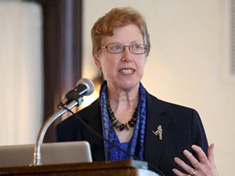-
Susan Martin: Migration a Climate Adaptation Strategy, But Displacement More Dangerous
March 25, 2016 By Sean Peoples When it comes to environmental change, “policies and laws can have a very productive contribution toward positive adaptation, or they can subvert that and constrain options,” says Jon Unruh, associate professor of human geography and international development at McGill University, in this week’s podcast.
When it comes to environmental change, “policies and laws can have a very productive contribution toward positive adaptation, or they can subvert that and constrain options,” says Jon Unruh, associate professor of human geography and international development at McGill University, in this week’s podcast.“Migration is a risk management strategy,” says Susan Martin, the Donald G. Herzberg professor of international migration at Georgetown University’s School of Foreign Service, in this week’s podcast. “It’s a way people have coped for millennia when the environment changes.” But climate change is forcing a new calculus on many households and communities who face a dynamic mix of economic, political, demographic, and environmental pressures.
“‘Migration’ can be a very positive thing for people,” says Martin, whereas “‘displacement’ may be positive in being lifesaving but not necessarily positive in terms of people’s future wellbeing.”
Martin sees the dichotomy between migration and displacement through a series of climate-induced shifts in mobility patterns.
“If there are no legal ways you can move…people are going to be at significantly higher risk”“Drought and rising sea levels are likely to lead to gradual movements of people,” she says. In fact, people manage these kinds of risks with anticipatory migration as environmental conditions decline. Often some family members “will stay and try to keep farming despite the drought,” while others “will move to cities or move to other countries in order to be able to diversify the sources of livelihood and sources of support for the family.”
Acute natural disasters and competition over dwindling resources “will more likely lead to emergency displacement,” Martin says, and it is during these events where community resilience and vulnerability play out in critical ways.
At-risk and vulnerable groups who cannot adapt as quickly will lose out on the positive aspects of migration as an adaptation strategy. “Research is showing only those with existing resilience possibilities and lesser levels of vulnerability are likely to benefit from even anticipatory migration,” Martin says.
Government policies have a part to play in building resilience – or, conversely, exacerbating vulnerabilities. National governments have been slow to adopt legal frameworks that address these issues. “If there are no legal ways you can move,” Martin says, “whether it’s internal or international, the chances are people are going to be at significantly higher risk.”
Susan Martin spoke at a private event at the Wilson Center on August 31, 2015.
Friday Podcasts are also available for download on iTunes and Google Podcasts.
 A Publication of the Stimson Center.
A Publication of the Stimson Center.

 When it comes to environmental change, “policies and laws can have a very productive contribution toward positive adaptation, or they can subvert that and constrain options,” says Jon Unruh, associate professor of human geography and international development at McGill University, in this week’s podcast.
When it comes to environmental change, “policies and laws can have a very productive contribution toward positive adaptation, or they can subvert that and constrain options,” says Jon Unruh, associate professor of human geography and international development at McGill University, in this week’s podcast.

